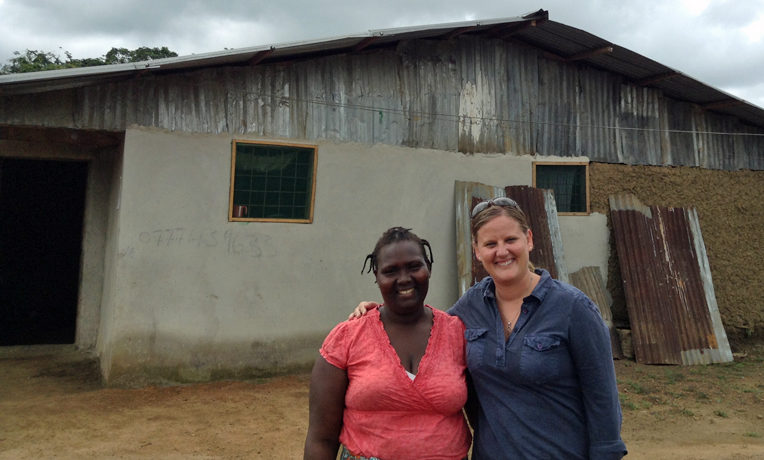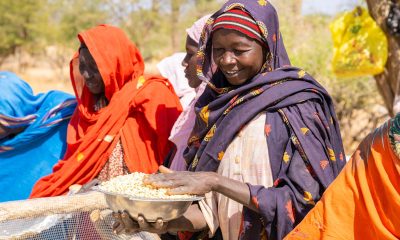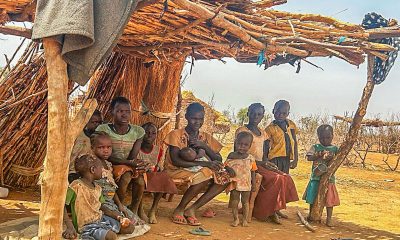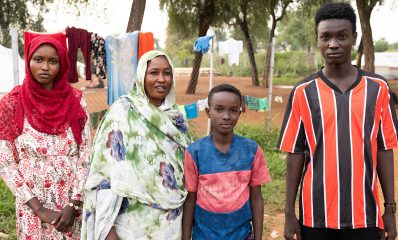A woman who has taken in 15 children receives training, tools, and seeds from Samaritan’s Purse
Today, I met a woman named Jenneh. At first glance, she is a healthy, vibrant, Liberian woman, eager to welcome me to her community and to her home. As we walked down the dirt path just out of town toward Jenneh’s home, a young girl met us with large eyes and a big smile.
“The malaria went to her brain when she was 3, so she is mentally not OK,” Jenneh said. “But she seems to be picking up as of late.”
She gently grabbed her hand and continued walking with us.
We approached Jenneh’s home, a simple 30 feet by 30 feet structure, half plastered with cement and half with mud. As we sat under the mango tree, I asked Jenneh how many people were living in the house with her.
“I can’t tell … I have over 15 children,” she said. “It is me and my sister there in the house with the children.”
Jenneh’s community was hit hard by ébola in September and October of 2014. Her mother contracted the virus first.
“My mother was a very loving person,” Jenneh said. “She was always willing to help other people. So when she became sick, many people came to take care of her. Of those people that cared for her, over half of them died.
“At that time, the community of Woroken, located just outside of Monrovia which means ‘under the forest’, was still in denial that Ebola was real. I lost my mother, my two sisters, my aunt, my nephew … altogether 10 persons from my immediate family were lost from me.”
But Jenneh is also an Ebola survivor. She heard about the Ebola hotline and that there were units where people could receive treatment for the virus. She called the hotline, and an ambulance came to gather her and her sick family members. They were taken to Redemption Hospital, where they were supposed to be tested for Ebola and transferred to an Ebola Treatment Unit on ELWA Campus. For some reason, she and her family were left at Redemption for five days, awaiting news on when they could be transferred to ELWA3.
Jenneh recalled the last day she was at Redemption vividly. She could not stop vomiting or emptying her bowels, and her fever was out of control.
“I had fallen off,” she said. “I could not talk. My body and mouth were too heavy for me to even speak. But God did something for me that day. As I laid there unable to talk, my body was suffering from real fever; I had been vomiting and toileting for three days straight. I saw a man enter the room—a tall man with lots of hair. He came over to me, and he was holding a cup. He came and sat on the bed next to me. I can still remember his face. I couldn’t talk to him, but he was talking to me. He took his hands and began rubbing my legs. His hands were very cool, and it was like the cool from his hands was entering my body as he touched me. After he rubbed my body, he brought the cup to my mouth and wanted me to drink. I could see him and hear him, but I was not able to respond. I didn’t want to drink from the cup, which contained water, but he urged me to drink. After drinking, I immediately came to. The man was not in the room and nowhere to be found.”
That day, the ELWA3 ambulance arrived to transfer Jenneh out of Redemption Hospital. Jenneh was able to get up and walk to the ambulance without assistance, when just that morning she had been unable to move or speak.
“God really did something for me that day,” she said. “I went to ELWA3 and spent one month and three days there, but I was never as bad off as I was before seeing that man.”
An Advocate in Her Community
Jenneh was the first survivor from her community and urged people to go to the Ebola Treatment Unit for treatment.
“For three months the ambulances were in our community constantly, carrying people to ELWA,” she said. “I would tell people that if I could survive, given the condition you saw me in, then they can survive too.”
Jenneh, 39 years old; single; and an Ebola survivor, did what she had to do—she took in all of the children of her deceased family members.
“People would give me small, small money to help with the children,” she said. “I would use some to feed them and save some so that I could build a house to fit all of us.”
The fruit of her labor was standing there in front of me. Although some people would consider the house unsuitable, I was filled with awe at what she had accomplished.
Because Jenneh was treated at ELWA3, her name was included on the registry of Ebola survivors in Liberia, which Samaritan’s Purse uses to identify individuals impacted heavily from the outbreak. Provided with training on urban gardening from Samaritan’s Purse, Jenneh and her sister are now using part of her mother’s land as a garden to grow cabbage, okra, corn, and hot pepper, all to assist her in providing for her large family.
“The program has really helped me,” she said. “The children can eat! So the garden has helped reduce the burden for food. The children also help me in the garden. I pass on the knowledge that has been given to me and teach it to them as well.”
Jenneh’ s desire is to continue to use the vegetable harvests to feed her family and to save enough money to pay the school fees of her 15 children.
“The children are thankful. They know it is not easy on me, and they are thankful for anything I can provide for them while we are in this condition.”
Jenneh gave no signs of feeling sorry for herself. There was no complaint from her that she needed more assistance, though it was obvious her needs were many. As we prepared to leave, four of her children arrived from the bush, carrying firewood on their heads to be used for cooking in the next week.
“Thank you, yah!” Jenneh said to each one of the children as they passed.
It is a simple gesture to most, but it spoke volumes to me that Jenneh knew she needed the children as much as they needed her.







